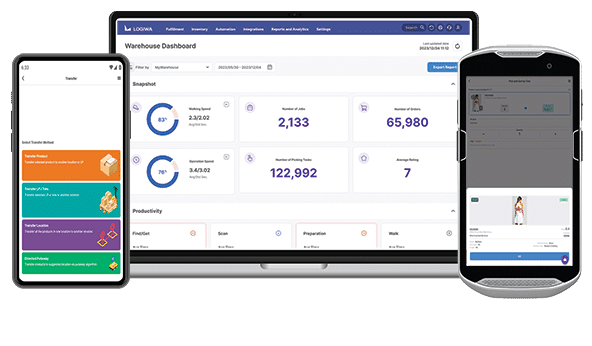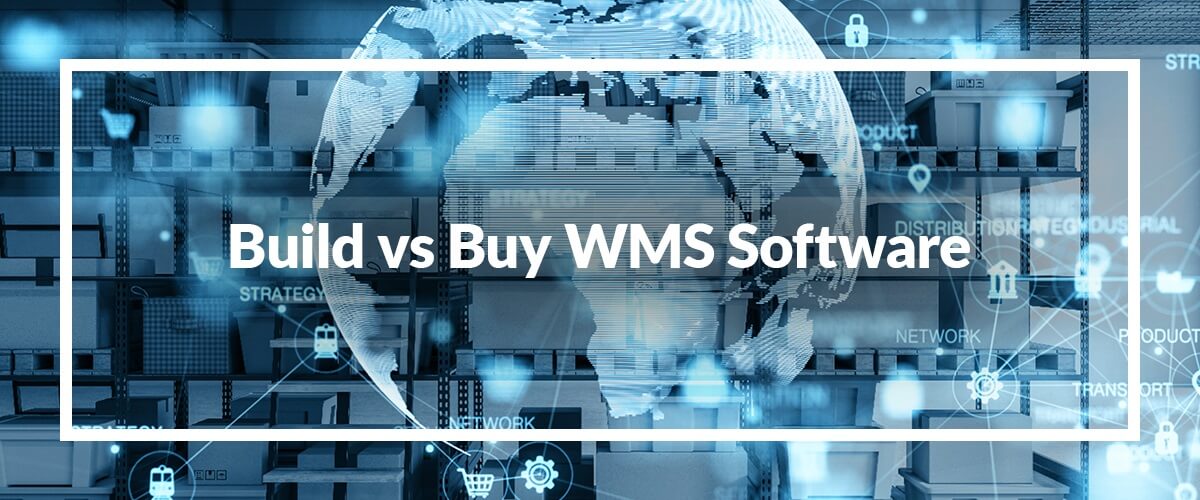To build, or not to build, that is the question. When it comes to the perfect warehouse solution, it can feel like a toss up whether building or buying a warehouse management system (WMS) is the right choice. Building a “custom fit” WMS has its benefits, but so does adopting a competitive proprietary solution from established software vendors.
It’s a critical decision, one which impacts your ability to meet the ever-increasing demands of today’s consumer market. Let’s discuss the pros and cons of building and buying a WMS, considerations to help you make the best choice for your operations.
Key Takeaways
- The growing complexities of modern ecommerce and omnichannel fulfillment have intensified the debate between building a custom WMS and buying a pre-built solution.
- Custom WMS solutions promise tailored functionalities but involve costly investments of time, money and resources, while pre-built systems offer competitive speed and ROI yet can lack the specificity required for unique operational needs.
- Custom and pre-built WMS solutions both offer pros and cons, but one option is likely best for optimizing performance and supporting the unique operational goals of a business.
- The decision to build or buy a WMS hinges on a business’s resources, technical expertise, cost, process needs and long-term adaptability.
- The choice between building and buying involves evaluating immediate operational needs and future adaptability, with Logiwa WMS offering a solution that caters to both.
Contents
Era of WMS Build vs. Buy
The debate around building versus buying a WMS has gained significant traction among warehouse operators in light of the evolving challenges of modern ecommerce and omnichannel fulfillment. The struggle to find an agile, scalable and cost-effective solution capable of supporting niche processes has led many operations to question which approach is truly best.
Custom warehouse management solutions offer the promise of tailor-made functionality, but they come with the burden of development time, cost and certain competitive weaknesses. Pre-built WMS solutions promise faster implementation and lower initial expenses but may lack the specificity required to sustain unique operations and existing tech stacks.
Pros and Cons of Building a Custom Warehouse Management System (WMS)
When it comes to fulfillment logistics, your business cannot risk having anything less than the most efficient and competitive solution possible. Let’s talk through the advantages and disadvantages of pre-built and custom WMS solutions.
Pros of Building a Custom Warehouse Management System (WMS)
- Custom-built WMS solutions stand a greater chance of meeting specialized needs because they are not limited to a vendor’s existing system or configuration capabilities.
- So long as you have the required resources, a custom WMS can be modified to add or remove functionalities at will, ensuring you only have features you need – no more, no less.
- Custom systems can be built specifically to integrate your current technology stack and desired integrations, so you do not need to change.
- Proprietary WMS solutions offer pre-established integrations and custom connections, but using them can come with additional fees unlike a custom-built WMS.
- With a custom WMS, you forgo the monthly service charges associated with software as a service (SaaS) vendor models.
Cons of Building a Custom Warehouse Management System (WMS)
- Designing and building a Custom WMS is expensive in terms of resources, time, and financial commitment. It requires ongoing maintenance and upgrades which can increase costs.
- Building a WMS is a complex project that diverts a lot of attention, manpower and money away from primary business objectives, and oftentimes ends in disappointment.
- Custom-built WMS solutions cannot truly compete with the expertise of established vendors, meaning you will be at a competitive disadvantage.

Pros and Cons of Buying a Pre-Built Warehouse Management Systems (WMS)
Pros of Buying a Proprietary WMS
- Proprietary WMS solutions are quicker and easier to implement because they eliminate time spent on research and development.
- Pre-built solutions come equipped with tried-and-tested functionalities and cutting-edge features, honed through extensive industry experience, to accelerate time-to-value.
- Maintenance and updates are simpler with pre-built solutions because providers regularly release patches and enhancements.
- Pre-built WMS solutions are cost-effective, as they eliminate the extensive financial investments around development, ongoing IT support and crisis resolution.
- Pre-built WMS solutions incorporate best practices and compliance standards, reducing the risk of errors and ensuring regulatory adherence without added work for your team.
Cons of Buying a Proprietary WMS:
- Pre-built WMS solutions cover a wide range of needs and scenarios, but some may not align perfectly if you have specific customization requirements.
- A pre-built WMS requires you to stay in your vendor’s ecosystem, which can limit your ability to adapt and evolve your system features independently.
- You may have to change your operations, or expend time and resources into making the pre-built WMS mesh with your current facility setup, workflows and solutions stack.
Custom and pre-built WMS solutions both offer a variety of pros and cons, but depending on your business, one option is likely best for optimizing performance and supporting your unique operational goals.
How to Choose Between Building vs. Buying a WMS
Whether you choose to build or buy a WMS, it’s important to be clear and intentional about your decision. Consider the following questions as you debate whether to build a custom WMS or buy a pre-built solution.
How much time do you want to spend getting a WMS in place?
It can take a long time to build a custom WMS. Researching, designing, testing and implementing it can take years. If your team gets pulled away from the task, perhaps to resolve some other technical issues, it can take even longer. This can delay the profits, client growth and network scalability you hope to achieve once the product is complete.
The timeframe for rolling out a proprietary WMS is a fraction of that time, sometimes as little as 6-8 weeks. Due to their high level of configurability and flexibility (e.g. adding in more product lines, clients, warehouse locations, etc.), one speedy integration can lead to even faster network expansion. With the foundation in place, you can start building out your business all on your own.
How much money do you want to invest?
Custom solutions offer several attractive advantages when it comes to cost. Firstly, they do not require a monthly subscription. Most WMS vendors operate with a SaaS model, meaning you pay as you go, which can add up over time. Secondly, pre-built solutions can result in additional fees related to custom-built integrations, features access and specialized services – all of which can increase your monthly bill. A custom solution lets you avoid both scenarios.
That said, custom solutions are notoriously expensive to build and maintain over time. Pre-built WMS users typically see a return on investment (ROI) within the first year due to the vendor’s ability to provide a fast, effective launch, free of research and development costs. Moreover, vendors offer professional services and cost-saving system enhancements as part of your SLA, meaning you’ll never have to divert your technical resources, hire outside support or break budget to resolve complex issues on your own.
Can you guarantee the outcome?
Custom-built and pre-built solutions both offer benefits when implemented successfully, but the process of building and maintaining a custom WMS must not be taken lightly. If you have a team of experienced, in-house software developers, you may reap the benefits of constructing a tailored WMS—even if it takes some extra time and upfront investment. But if your team is unprepared to take on the complexities of building a modern fulfillment system, you could be wasting precious money and resources to make a less-than-satisfactory solution.
Modern WMS solutions support multiple fulfillment functions, from order management, inventory management, warehouse operations (e.g. receiving, putaway, picking and packing) to shipping and return logistics using robust integration tools, smart automation and artificial intelligence (AI). If you choose to build your own solution, your team must be certain they can handle the undertaking and provide industry expertise comparable to that of leading WMS vendors to ensure a return on investment.
Are you looking for a short-term fix or a long-term solution?
The short and long-term impacts of building or buying a WMS should play a factor in your decision. When it comes to taking a custom approach, the short-term appeal is that you can build off of your existing operations and solutions stack, ensuring your specific needs are met. Long-term, you can make adjustments on your terms, directly handle your own technical support and forgo major system changes as your vendor’s solution evolves.
Proprietary WMS solutions are built to ensure they can compete with competitors and keep up with the fast pace of innovation, making them a flexible, future-proof choice. Moreover, as software vendors incorporate the needs of clients, all their users benefit as a result. That means pre-built solutions, in addition to evolving faster, can ensure you have access to the latest fulfillment features, relevant integrations, data security and so on.
Logiwa WMS Offers the Best of Both Worlds
In the warehouse management realm, the choice between custom-built and pre-built WMS has a major impact on business success. Custom solutions promise tailored features but demand substantial time, resources, and expertise, whereas pre-built systems offer speed, cost-effectiveness and competitive longevity.
Choosing hinges on your business’s resources, expertise and long-term goals, striking a balance between immediate needs and future adaptability. Logiwa WMS makes the decision between building and buying easy. Our cloud WMS and fulfillment platform offers:
- Competitive implementation time (only 6-8 weeks for your first warehouse)
- Robust catalog of self-serve feature and high levels of configurability to ensure all operational needs are met
- No additional professional services fees
- Powerful integration tools, including Integration Orchestrator, to build custom connections to ecommerce platforms, shipping carriers, robotics systems, ERP and accounting solutions, and even custom-built solutions (e.g. order management systems (OMS), client relationship management (CRM) software, etc.)
Learn more about how to build a unique fulfillment model that combines pre-built and self-made solutions in the blog, “WMS Integration Technology That Cannot Fail: The Logiwa Difference.”
FAQs Related to Building or Buying a Warehouse Management System
What factors should I consider when deciding between building vs. buying a WMS?
Consider factors such as your business’s specific needs, available resources, budget constraints, desired implementation timeline, and long-term scalability requirements. Assessing these aspects will help you make an informed decision that aligns with your warehouse management objectives.
What are the advantages of building a custom WMS over buying a pre-built one?
Building a custom WMS provides the advantage of tailored functionalities, ensuring that the system precisely fits your unique operational requirements. It allows for seamless integration with existing tech stacks and offers the flexibility to modify features as needed. However, it comes at the cost of significant time, resources, and expertise.
How does a pre-built WMS solution compare to a custom-built WMS in terms of implementation speed and cost-effectiveness?
Pre-built WMS solutions offer faster implementation times and are often more cost-effective overall. They come equipped with tried-and-tested functionalities, reducing the time spent on research and development. In contrast, custom-built solutions take longer to develop and may involve higher initial costs due to development time and specialized expertise required.
Run a digital fulfillment experience with a fully integrated Cloud WMS Software
Warehouse Management
Modern digital WMS powers a modern fulfillment experience





